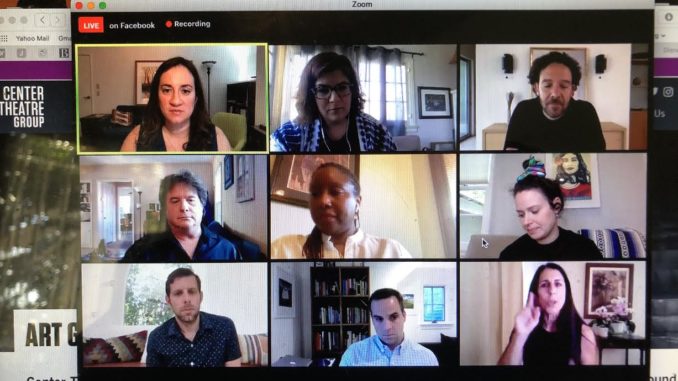
For me, March was shaping up to be a month of theatre. As the month started I had just reviewed Can’t Pay, Won’t Pay at Actors’ Gang, had plans to review two more shows at the Kirk Douglas and Westchester Playhouse, and had finally scored tickets to the hottest show in town – Hamilton at the Pantages – mid month. As the days counted down, however, my excitement for these experiences took on a more worrisome aspect as news of growing Covid-19 infections started coming in. As much excitement I had about seeing these shows, would I be putting myself or my family at risk by going? And then two days before Hamilton, everything shut down.
If that was my experience, what must the artists involved in the multitude of shows and performances around Los Angeles be feeling? And as the days went on under stay at home orders, many of these artists started pondering the question “What next?” Last Thursday, the Center Theatre Group’s Art Goes On programming attempted to answer this question as part of its LA Theatre Speaks live-streaming series with “LA Theatre Goes Digital: Creating Online.” CTG assembled a panel of representatives from eight local theatre companies as well as two outside voices to try and answer that question. The discussion was wide-ranging, hitting on issues from how are theatres reacting immediately to how does this affect the audience and community to monetary concerns and what might the future hold. The views were both informative and fascinating.
All the panelists talked about how the immediate shutdown threw current productions and future plans into chaos. Some, like Yuval Sharon (artistic director of The Industry, an experimental opera company) and Stephen Sacks (artistic director of The Fountain Theatre) discussed moving up taping of their companies current productions in order to capture them before it was too late. Many, like Katie Lowes (co-artistic director of IAMA Theatre Company) and Amy Levinson (Associate Artistic Director of the Geffen Playhouse) talked about immediately pivoting to create online content, such as IAMA at home’s Happy Hour reading series and the Geffen Stayhouse. But it quickly became apparent that for all the participants, figuring out how to transition was a more complicated proposition.
The issues that soon emerged speak to the essence of what theatre is and can be in this new digital environment, as well as how do you navigate the desire to create and connect with audiences with a sustainable financial model that ensured these companies would survive.
Most of the companies had archives of previous shows (some like the Fountain Theatre go back 30 years or more); however, things weren’t so simple as just putting up their archives to stream. While the Geffen Playhouse was able to do this because of a partnership with Broadway HD they had established a few seasons ago, the others struggled with the economic realities of the streaming environment. Discussions with unions were, and are, needed to ensure the artists are compensated for their contributions, which lead to questions about what audiences would pay, if anything, to view this type of content.
Because of its previous relationship with magician Helder Guimarães, the Geffen Playhouse was able to quickly mount a digital production. The Present is an interactive production done over the digital platform Zoom (with assistance from the USPS for delivery of a “mysterious package) for 25 households participating at a time. The experience, which Levinson said came together in two to three weeks because of their strong relationship with the artist (who is not covered by Equity union rules) and was not without its difficulties, including the steep learning curve into digitial platforms and what would work to convey the performance best. It seems that the Geffen has hooked into something because performances of the The Present quickly sold out.
One thing the panelists all agreed upon is that this moment will shape the future of theater in ways many found inspiring. The Oregon Shakespeare Festival Artistic Director Nataki Garrett and Deaf West Theatre Artistic Director DJ Kurs both spoke passionately about how online experiences can both open up theatre to marginalized audiences who find the online space a more welcoming environment than brick and mortar theaters and how the issues of accessibility for all patrons, including the disabled, now take on greater meaning as companies pivot to online platforms. All the participants agreed that the possibilities of widening their audience and community to new voices is particularly exciting. As is the prospect of how moving content online and finding ways to create in this new digital environment will provide innovation that will remain long after the pandemic ends.
Ultimately, the panel left viewers with the feeling that the theatre world will be better off in the long run with the changes wrought by this challenging time, and that the enduring spirit of community theatre provides is always there, even if we are not experiencing it in person.
The next entry in the LA Theatre Speaks series is on May 21st with LA Playwrights: Writing for a Changing World.
To RSVP for this event, view the complete schedule, and/or check out the video of this discussion (and others), visit https://www.centertheatregroup.org/art-goes-on/l-a-theatre-speaks/.
Brenna Guthrie


Be the first to comment